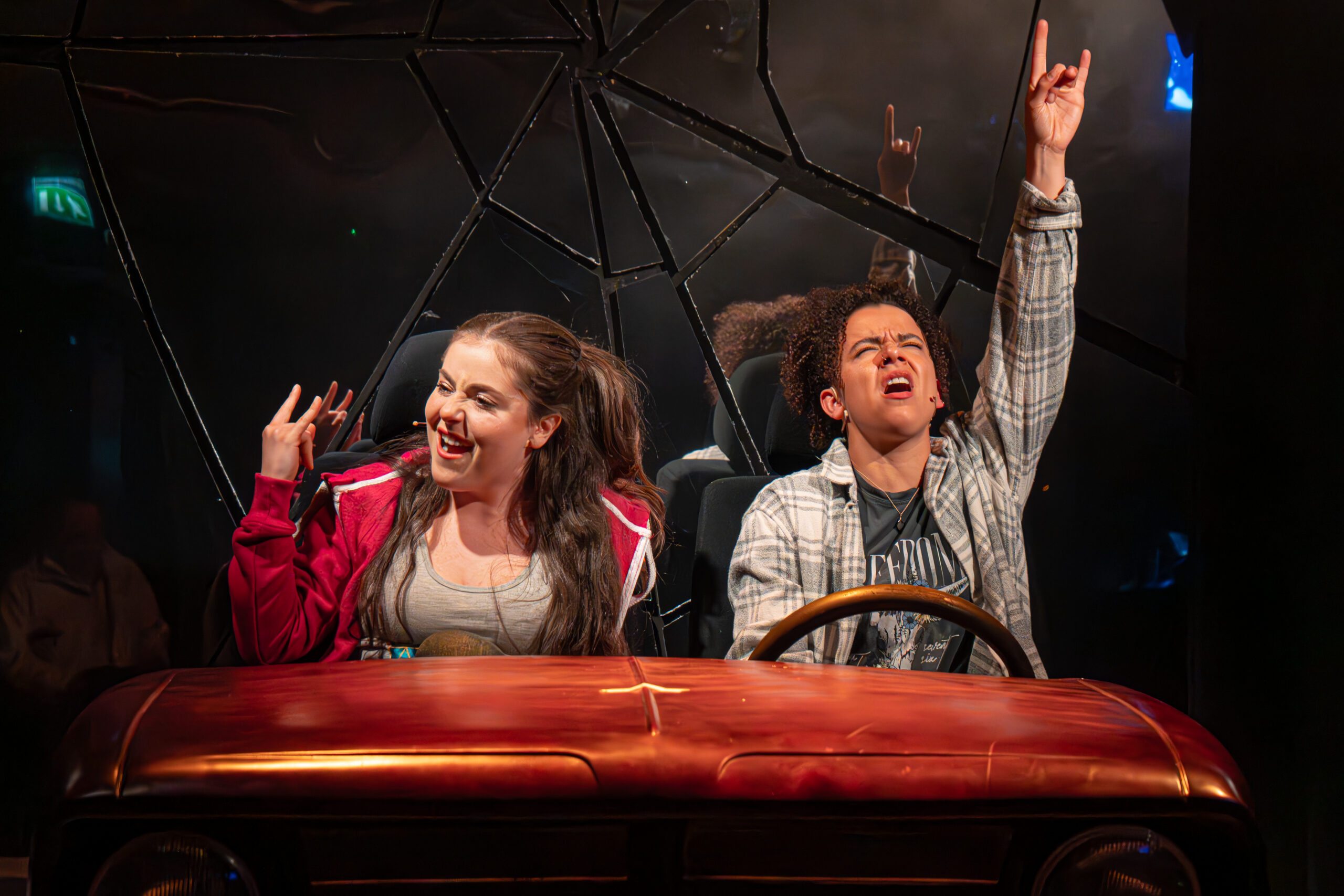Kait Kerrigan and Bree Lowdermilk’s The Mad Ones is a contemporary chamber musical that leans into memory, adolescence, and grief, woven through with an alt-pop score and a non-linear structure. Originally titled The Unauthorized Autobiography of Samantha Brown, it centres on a high school senior looking back on a defining moment: whether to stay or leave, and how the people around her — her mother, her boyfriend, and her best friend — shaped that crossroads. The show, popular in the U.S. through cast recordings and youth productions, receives its UK premiere in this intimate production at The Other Palace Studio.
The set cleverly evokes both the literal and emotional landscape of the show. Glass panels hang fractured above the stage, perhaps echoing the aftermath of a crash or a mind shattered by loss. The space is tight for a musical, which sometimes limits the staging, but director Emily Susanne Lloyd makes good use of what’s there. The show opens with a kind of fourth-wall-breaking swirl, drawing the audience into Samantha’s memory-scape. The early driving scenes are particularly effective: sharply written, well-paced, and funny, they anchor the characters with clarity and warmth, especially the boyfriend Adam, whose mix of charm and haplessness delivers genuine humour.
At the heart of The Mad Ones is a sense of frozen time — a life paused at the edge of decision. The narrative gradually reveals that Samantha’s best friend Kelly died in a car crash, and much of the musical unfolds in a liminal space, as Sam looks back on what led up to that moment. But while the structure aims for poignancy, it sometimes loses momentum. The first half is engaging, buoyed by strong character work and natural chemistry between the cast. Yet the second half drifts, looping through similar beats and prolonging its emotional resolution. Just as you expect an ending, another song arrives, and the lack of a true finality slightly undermines the catharsis.
As Samantha, Dora Gee handles the score with clarity, and her voice blends well with the ensemble — especially in the harmonised numbers. But the character’s arc feels underpowered. There’s a meekness to her portrayal that remains static, and while that may be a deliberate reflection of her indecision, it doesn’t offer enough internal contrast to sustain her central role. Courtney Stapleton’s Kelly, by contrast, is vivid — energetic and affectionate, if occasionally lacking dimension — and the production plays heavily on their closeness. The frequent physical intimacy and glances suggest a romantic subtext that’s never fully addressed, adding a layer of ambiguity to their bond.
The standout performance comes from Thea-Jo Wolfe as Sam’s mother, Beverly. Her vocal control is superb, and she brings a measured grace to the role, balancing wit and tenderness. The chemistry between mother and daughter feels lived-in and authentic, and their scenes together ground the show in emotional truth. Jacob Fowler’s Adam serves as comic relief — sometimes knowingly pathetic, sometimes sincere — and injects some much-needed levity.
Musically, the score is more functional than memorable. It does the job of carrying the story forward, often through narration rather than standalone numbers. One exception is “The Proposal,” which captures the musical’s blend of longing and recklessness and sticks in the memory. The harmonies throughout are tight and well-balanced, showcasing the cast’s vocal blend more than individual standout moments.
Set and lighting design work hand-in-hand to create atmosphere: moody, youthful, with bursts of colour and intimacy. There’s a tactility to the way the space shifts — platforms and props move fluidly, and scene changes are brisk and clear, despite the confined space.
The Mad Ones is a thoughtful piece that captures something tender about teenage grief and the paralysis of choice. But this production, while well-performed and cleverly staged, struggles to sustain its emotional energy through to the end. Still, it offers an earnest portrait of memory and mourning, delivered with care and talent by a cast clearly invested in the material.

